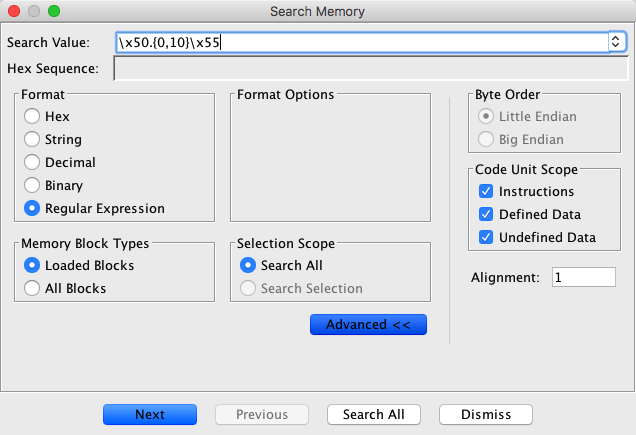
Memory searches in Ghidra can use regular expressions for powerful and flexible searches. This feature uses Java's built-in regular expressions grammar, so the syntax is exactly the same as a regular expression for any standard Java application. Because of restrictions on how regular expressions are processed, regular expression searches can only be performed in the forward direction. Unlike standard string searches, case sensitivity and unicode options do not apply. The Search Memory dialog below shows a sample regular expression entered in the Value field.
 |
cafebabe
Searches for the string "cafebabe"
\x30\x31
Searches for the byte 0x30 followed by the byte 0x31
abc\n[^a]abc
Searches for "abc" followed by LF, followed by any character other than a, followed by "abc"
[a-z]{1,5}.
Searches for any letter in the range a-z occurring 1-5 times followed by any character
\x50.{0,10}\x55
Searches for 0x50 followed by 0-10 occurrences of any character, followed by 0x55
(..[\x50-\x5f]\x00)\1{15}
Matches 16 runs of an address, in a row, with the value 0x005????, where ?? can be any byte value; for example, 0x00512345
The following is the full syntax for Java's regular expression grammar from Oracle's Pattern class javadoc (https://docs.oracle.com/javase/8/docs/api/java/util/regex/Pattern.html)
Construct Matches Characters x The character x \\ The backslash character \0n The character with octal value 0n (0 <= n <= 7) \0nn The character with octal value 0nn (0 <= n <= 7) \0mnn The character with octal value 0mnn (0 <= m <= 3, 0 <= n <= 7) \xhh The character with hexadecimal value 0xhh \uhhhh The character with hexadecimal value 0xhhhh \t The tab character ('\u0009') \n The newline (line feed) character ('\u000A') \r The carriage-return character ('\u000D') \f The form-feed character ('\u000C') \a The alert (bell) character ('\u0007') \e The escape character ('\u001B') \cx The control character corresponding to x Character classes [abc] a, b, or c (simple class) [^abc] Any character except a, b, or c (negation) [a-zA-Z] a through z or A through Z, inclusive (range) [a-d[m-p]] a through d, or m through p: [a-dm-p] (union) [a-z&&[def]] d, e, or f (intersection) [a-z&&[^bc]] a through z, except for b and c: [ad-z] (subtraction) [a-z&&[^m-p]] a through z, and not m through p: [a-lq-z] (subtraction) Predefined character classes . Any character (may or may not match line terminators) \d A digit: [0-9] \D A non-digit: [^0-9] \s A whitespace character: [ \t\n\x0B\f\r] \S A non-whitespace character: [^\s] \w A word character: [a-zA-Z_0-9] \W A non-word character: [^\w] POSIX character classes (US-ASCII only) \p{Lower} A lower-case alphabetic character: [a-z] \p{Upper} An upper-case alphabetic character:[A-Z] \p{ASCII} All ASCII:[\x00-\x7F] \p{Alpha} An alphabetic character:[\p{Lower}\p{Upper}] \p{Digit} A decimal digit: [0-9] \p{Alnum} An alphanumeric character:[\p{Alpha}\p{Digit}] \p{Punct} Punctuation: One of !"#$%&'()*+,-./:;<=>?@[\]^_`{|}~ \p{Graph} A visible character: [\p{Alnum}\p{Punct}] \p{Print} A printable character: [\p{Graph}] \p{Blank} A space or a tab: [ \t] \p{Cntrl} A control character: [\x00-\x1F\x7F] \p{XDigit} A hexadecimal digit: [0-9a-fA-F] \p{Space} A whitespace character: [ \t\n\x0B\f\r] Classes for Unicode blocks and categories \p{InGreek} A character in the Greek block (simple block) \p{Lu} An uppercase letter (simple category) \p{Sc} A currency symbol \P{InGreek} Any character except one in the Greek block (negation) [\p{L}&&[^\p{Lu}]] Any letter except an uppercase letter (subtraction) Boundary matchers ^ The beginning of a line $ The end of a line \b A word boundary \B A non-word boundary \A The beginning of the input \G The end of the previous match \Z The end of the input but for the final terminator, if any \z The end of the input Greedy quantifiers X? X, once or not at all X* X, zero or more times X+ X, one or more times X{n} X, exactly n times X{n,} X, at least n times X{n,m} X, at least n but not more than m times Reluctant quantifiers X?? X, once or not at all X*? X, zero or more times X+? X, one or more times X{n}? X, exactly n times X{n,}? X, at least n times X{n,m}? X, at least n but not more than m times Possessive quantifiers X?+ X, once or not at all X*+ X, zero or more times X++ X, one or more times X{n}+ X, exactly n times X{n,}+ X, at least n times X{n,m}+ X, at least n but not more than m times Logical operators XY X followed by Y X|Y Either X or Y (X) X, as a capturing group Back references \n Whatever the nth capturing group matched Quotation \ Nothing, but quotes the following character \Q Nothing, but quotes all characters until \E \E Nothing, but ends quoting started by \Q Special constructs (non-capturing) (?:X) X, as a non-capturing group (?idmsux-idmsux) Nothing, but turns match flags on - off (?idmsux-idmsux:X) X, as a non-capturing group with the given flags on - off (?=X) X, via zero-width positive lookahead (?!X) X, via zero-width negative lookahead (?<=X) X, via zero-width positive lookbehind (?<!X) X, via zero-width negative lookbehind (?>X) X, as an independent, non-capturing group